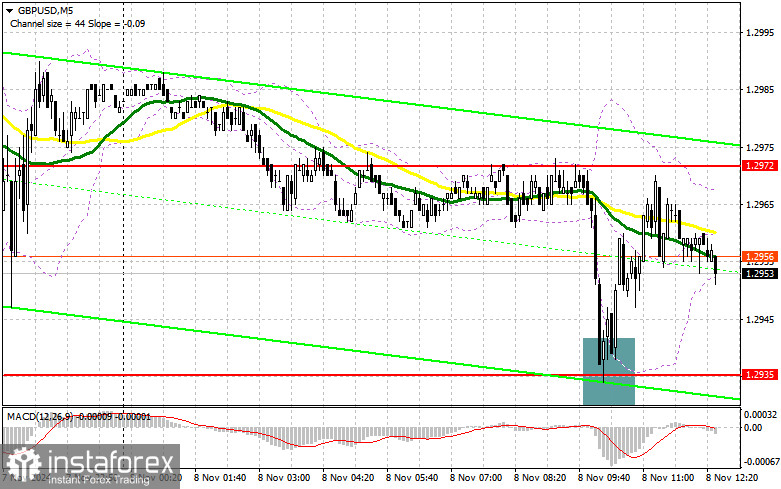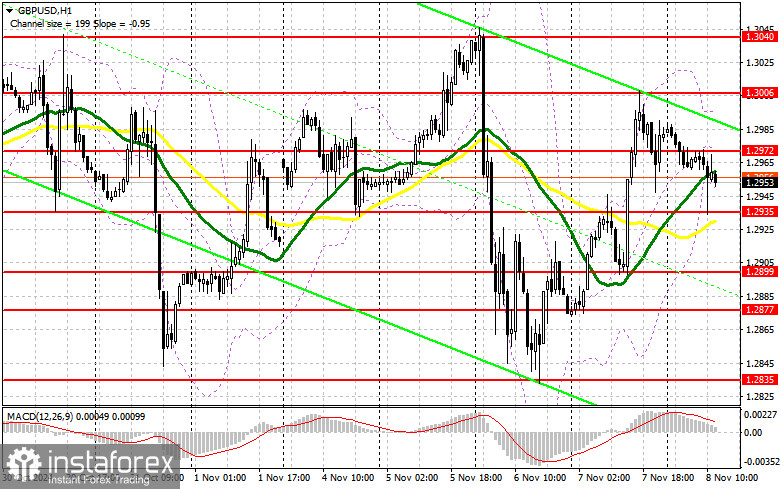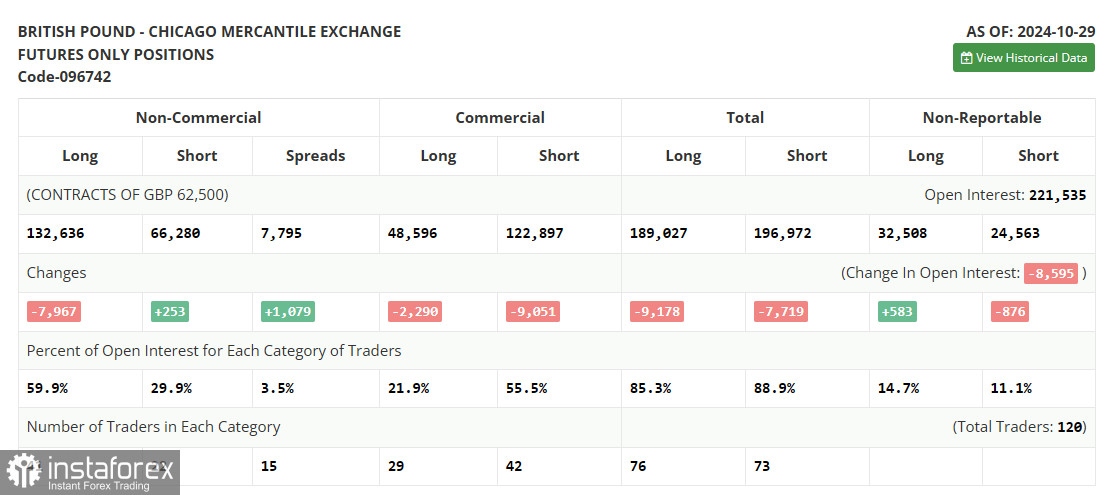In my morning forecast, I highlighted the 1.2935 level as a key area for making trading decisions. Let's examine the 5-minute chart to analyze what happened. A decline and false breakout around 1.2935 provided a strong entry point for buying the pound, resulting in a rise of over 40 points. The technical outlook for the second half of the day remains unchanged.

To Open Long Positions on GBP/USD:
The sharp drop in the pound to 1.2953 was met with strong buying interest, indicating demand during significant corrections. In the second half of the day, the University of Michigan Consumer Sentiment Index, inflation expectations, and a speech by FOMC member Michelle Bowman are due. While the Fed's stance is already clear, the data could still influence the market. Strong statistics may put renewed pressure on the pair.
The best opportunity to buy would arise from a decline and a false breakout near support at 1.2935, already tested earlier today. This would confirm a strong entry point for long positions, targeting a recovery toward 1.2972. A breakout and retest of this range would provide a new buying opportunity, with the potential to advance toward 1.3006. The final target is 1.3040, where I plan to take profits.
If GBP/USD declines and bulls show no activity around 1.2935 in the second half of the day, the pair risks falling to the 1.2899 low, where it found strong demand yesterday following the Bank of England's rate decision. A false breakout at this level would be the only suitable condition for opening long positions. I also plan to buy GBP/USD on a rebound from 1.2877, targeting a 30-35 point intraday correction.
To Open Short Positions on GBP/USD:
Sellers attempted to make their presence felt but failed to achieve significant results. If the pair rises after the data release, defending resistance at 1.2972 will be the top priority. A false breakout there would provide an entry point for short positions, targeting a drop toward support at 1.2935, where the moving averages, favoring buyers, are located.
A breakout and retest from below of this range would deal a blow to bullish positions, triggering stop orders and opening the path to 1.2899. The final target is 1.2877, where I plan to take profits.
If GBP/USD rises and bears fail to defend 1.2972, buyers could attempt a larger correction by week's end. In this case, bears will retreat to resistance at 1.3006. I will sell at this level only after a false breakout. If there's no downward movement at this level, I will look for short positions on a rebound from 1.3040, aiming for a 30-35 point intraday correction.

COT Report Analysis:
The Commitment of Traders (COT) report for October 29 showed a decline in long positions and minimal growth in short positions. The expectation of a Bank of England rate cut at the next meeting continues to weigh on the pound. Additionally, recent turmoil surrounding the UK budget—set to be replenished through tax hikes under the new Prime Minister—further weakens the pound's growth prospects.
As a result, the pound is likely to face continued challenges, particularly against the backdrop of the U.S. elections and anticipated rate cuts in the UK. According to the latest COT report, non-commercial long positions decreased by 7,967 to 132,636, while non-commercial short positions increased by 253 to 66,280. The net difference between long and short positions widened by 1,079 contracts.

Indicator Signals:
Moving Averages:Trading above the 30- and 50-day moving averages suggests attempts at growth for the pound.
Note: The author analyzes moving averages on the H1 hourly chart, which differs from the standard definition of daily moving averages on the D1 chart.
Bollinger Bands:In case of a decline, the lower boundary of the indicator near 1.2945 will act as support.
Indicator Descriptions:
- Moving Average (MA): Smooths out volatility and noise to identify trends.Period: 50, marked in yellow on the chart.Period: 30, marked in green on the chart.
- MACD (Moving Average Convergence/Divergence): Measures the convergence/divergence of moving averages.Fast EMA: 12, Slow EMA: 26, SMA: 9.
- Bollinger Bands: A volatility indicator with a period of 20.
- Non-commercial traders: Speculators like individual traders, hedge funds, and large institutions using the futures market for speculative purposes.
- Non-commercial long positions: Total long positions held by non-commercial traders.
- Non-commercial short positions: Total short positions held by non-commercial traders.
- Net non-commercial position: The net difference between the total short and long positions held by non-commercial traders.
 English
English 
 Русский
Русский Bahasa Indonesia
Bahasa Indonesia Bahasa Malay
Bahasa Malay ไทย
ไทย Español
Español Deutsch
Deutsch Български
Български Français
Français Tiếng Việt
Tiếng Việt 中文
中文 বাংলা
বাংলা हिन्दी
हिन्दी Čeština
Čeština Українська
Українська Română
Română

